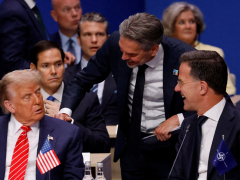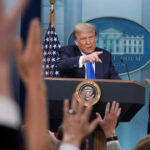Describing Israel and Iran fighting each other at his NATO pre-summit news conference in The Hague this week, US President Donald Trump drew an analogy with children fighting in a schoolyard, who eventually had to be separated.
“Daddy has to sometimes use strong language,” Mark Rutte, NATO secretary-general, chimed in.
Asked about the comment after the summit, Trump said: “No, he likes me. I think he likes me. If he doesn’t I’ll let you know. I’ll come back and hit him hard, OK? He did it very affectionately. Hey Daddy. You’re my Daddy.”
The White House decided Rutte was flattering the US president, and made a reel of Trump’s visit to the Netherlands, set to the music of Usher’s Hey Daddy.
Rutte’s flattery of Trump didn’t stop there. On tackling the Russia-Ukraine war, Rutte told reporters before the NATO summit: “When he came in office, he started the dialogue with President Putin, and I always thought that was crucial. And there’s only one leader who could break the deadlock originally, and it had to be the American president, because he is the most powerful leader in the world.”
But how sincere are world leaders’ statements about Donald Trump? Do they genuinely serve to improve bilateral relations and does flattery work?
Who has handled Trump well and what have the results been?
Neither Rutte, nor any other European leader, engaged in any kind of dialogue with Russian President Vladimir Putin for a long time after the summer of 2022, the year of his invasion of Ukraine, believing it pointless.
German Chancellor Olaf Scholz was severely criticised as “defeatist” for phoning Putin last November, while Hungary’s Viktor Orban and Slovakia’s Robert Fico, the only European leaders to have visited the Kremlin during the war, have been viewed as openly collaborationist.
Yet when Trump started talks with Putin, many Europeans paid him the same compliment as Rutte when they made their inaugural visits to the White House after he took office in January.
Keir Starmer, UK
“Thank you for changing the conversation to bring about the possibility that now we can have a peace deal, and we will work with you,” said the United Kingdom’s prime minister, Keir Starmer, in the Oval Office in February.
Starmer pulled a few rabbits out of hats. Knowing Trump’s fondness for the notion of hereditary power, he drew from his jacket a letter from King Charles III containing an invitation for an unprecedented second state visit to Windsor Castle.
Trump was momentarily speechless. “Your country is a fantastic country, and it will be our honour to be there, thank you,” Trump said when he’d gathered himself.
Starmer and Trump exchanged a few handshakes while speaking and Starmer repeatedly touched Trump’s shoulder in a sign of affection.
But did all this flattery have much effect? Trump announced he was freezing military aid to Ukraine the following month, much to the outrage of the UK, along with Nordic and Baltic countries.
Giorgia Meloni, Italy
Both Starmer and Italy’s prime minister, Giorgia Meloni, identified Ukraine as a key issue for Trump, who has made it clear he wants to win the Nobel Peace Prize by ending international conflicts. So far, he has claimed credit for ending this month’s “12-Day War” between Israel and Iran, preventing nuclear war following the May 7 air battle between India and Pakistan, and overseeing a peace deal between the Democratic Republic of the Congo (DRC) and Rwanda.
Meloni, therefore, tried a similarly flattering approach to Trump. “Together we have been defending the freedom of Ukraine. Together we can build a just and lasting peace. We support your efforts, Donald,” she said during her White House visit in April.
Meloni astutely punched all of Trump’s hot-button issues in her opening remarks, saying Italy had policies to combat Fentanyl, an addictive painkiller that Trump has blamed Canada and Mexico for allowing into the country, to invest $10bn in the US economy and to control undocumented immigration.
She even adapted Trump’s slogan, Make America Great Again, to Europe. “The goal for me is to Make the West Great Again. I think we can do it together,” Meloni said to a beaming Trump.
None of this has translated into a state visit by Trump to Rome, a move which would cement Meloni’s position as a major European leader, however.
Mark Carney, Canada
Meanwhile, newly elected Canadian Prime Minister Mark Carney was both flattering and firm with Trump last month. He complimented Trump on being “a transformational president” who had sided “with the American worker”, but also shut down Trump’s territorial ambition to annex Canada as the 51st US state. “It’s not for sale, won’t be for sale ever,” Mark Carney said.
Relations seemed to have taken a turn for the better following Tru




![YouTube Music redesign dealswith overruning overflow menu on Android [U]](https://theaustralian.info/wp-content/uploads/2024/01/63038-youtube-music-redesign-dealswith-overruning-overflow-menu-on-android-u.jpg)
